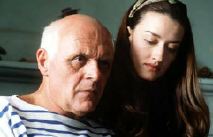Egotist & Cubist
The Owl and the Pussycat: In Merchant-Ivory's new film,"Surviving Picasso," the great artist (Anthony Hopkins) devours his many mistresses, including Françoise (Natascha McElhone).
Anthony Hopkins refuses hagiography in Picasso portrayal
By Richard von Busack
'SOME PEOPLE try to pick up girls and get called an asshole/That never happened to Pablo Picasso." These lyrics by Jonathan Richman sum up Surviving Picasso, the amusing Merchant-Ivory bio-pic. The film is kept juicy by Anthony Hopkins in a droll, virile embodiment of the great artist and even greater egoist, blissfully scrubbing away at Guernica while his wife and his girlfriend cat-fight below.
Surviving Picasso is reminiscent of the Alexander Korda/Charles Laughton The Private Life of Henry VIII, a light study without much context aside from Picasso's love live. Both entertainments mock a monarch's babyishness, a male ego unchained by shame; both are stories about men who would be laughable if it weren't for their habit of tossing women by the wayside.
Picasso doesn't have a chopping block, but his victims lose their heads nonetheless--two of his discarded lovers go mad. At least our heroine, Françoise (Natascha McElhone), Picasso's mistress beginning in 1943, and the mother of two of his children, is warned. "The air of his studio is like poison," says Picasso's bitter former mistress Dora Maar (Julianne Moore), "but soon you find you cannot breathe anywhere else."
Is Picasso actually Dracula? Apparently so; the affair with Françoise begins politely enough. She sheds her clothes; Picasso ignores her body and pensively starts examining the planes of her face. But soon he is forcing her to swear allegiance to him in front of an altar of God. Later, we see Dora, one of Picasso's leavings, covered with ghoul makeup and hurting herself with a knife.
Picasso's bloody-mindedness is reflected in imagery of an owl swooping down to devour a feral cat--no doubt meant to echo the situation of Françoise and Picasso (just as a close-up of a goat is no doubt meant to emphasize the goatiness of the master).
Hopkins, at least, takes Picasso's vanity as a joke, which is a pleasant contrast to the usual hagiography. Given a choice between the artist as saint and the artist as clown, one would take the second any time, while, of course, one would prefer the artist as human being.
Surviving Picasso is based on Arianna Huffington's book Picasso, Creator and Destroyer, which studies his artistic progress in terms of each of his wives' and mistresses' impressions of his work. It's a theory, but in movie terms, McElhone's hopeless performance leaves that theory highly unlikely; she seems to have been cast for her slightly uneven, Picassoish eyes more than anything else.
The movie asks us to believe in the influence of an inert woman on an utterly self-centered man, which is the opposite of Arianna and Michael Huffington's own life story. Ultimately, using Picasso's life as a lesson in the virtues of monogamy goes against the grain of a life that gave the dangerous but somehow inspiring example to just do one's art and let everybody else go to hell.
[ Metro | Metroactive Central | Archives ]
This page was designed and created by the Boulevards team.

Seth Rubin
Surviving Picasso (R; 125 min.), directed by James Ivory, written by Ruth Prawer Jhabvala, photographed by Tony Pierce-Roberts and starring Anthony Hopkins and Natascha McElhone.
From the October 10-16, 1996 issue of Metro
![[Metroactive Movies]](/movies/gifs/ma-movies.gif)